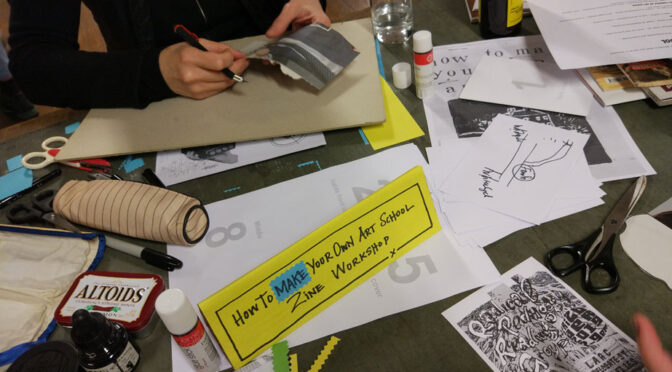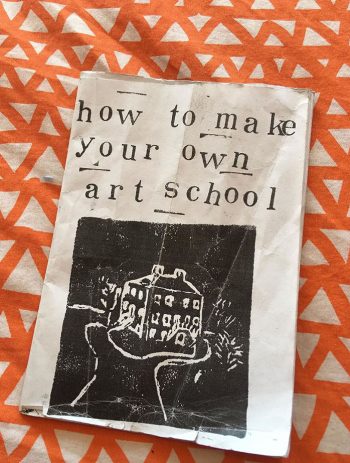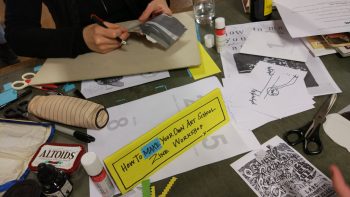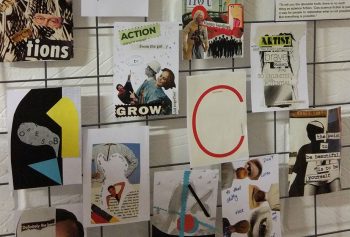Workshops on alternative art education and self-organisation
A series of workshops on alternative art education and self-organisation from 2017 to 2019. For a complete list of workshops please click here.
How To Start Your Own Art School zine workshop Alternative Art School Weekender 22-24 March Organised by TOMA (The Other MA)
Saturday, 23 March 2019, 12-4pm Ugly Duck, 49 Tanner St, London SE1 3PL Closest stations: London Bridge, Bermondsey All welcome
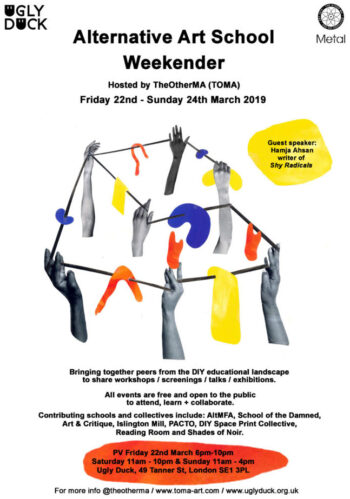 A collaborative DIY workshop to collect ideas on how to start an alternative art school in a handy, informative and entertaining guide made by its participants.
A collaborative DIY workshop to collect ideas on how to start an alternative art school in a handy, informative and entertaining guide made by its participants.
Help put together a guide on How To Start Your Own Art School! Come along to the workshop with your tips, ideas, stories, anecdotes, advice and full-blown manifestos.
We will use all kinds of techniques, including collage, drawing, calligraphy, cut-ups and fold-ins to produce A6 zine (148mm x 105mm).
Materials and tools will be provided but you are welcome to bring your own. The workshop will be a space to chill out, make something beautiful and exchange ideas on alternative art schools.
Click to download a PDF of the zine.
What is Alternative Art Education? UK Commons Assembly @School for Civic Action Organised by Public Works and Commons Rising
Friday, 20 July 2018, 10am-8pm Tate Exchange, 5th floor, Tate Modern, London SE1 9TG Tube/Train: London Bridge, Blackfriars, Southwark All welcome, booking via Eventbrite
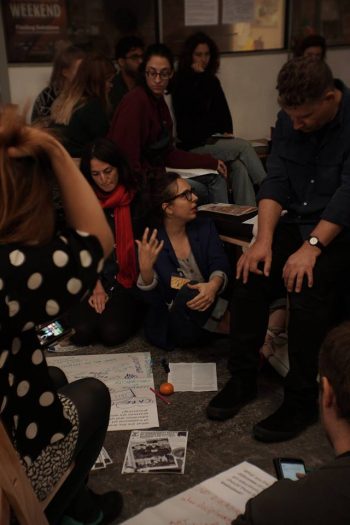
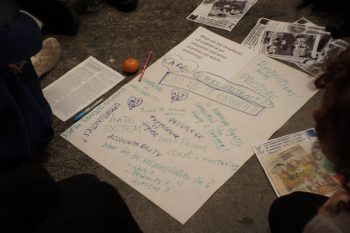
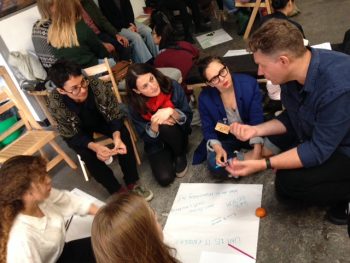
In the last ten years alternative art education has burgeoned into a full-blown movement, fuelled by economic crisis, austerity and the liberalisation of higher education. But what is alternative art education? Who is it for and what is it alternative to?
There are as many different formats and models of alternative art education as there are art schools, but in what ways is alternative art education expected to be different from traditional art education? Should alternative art schools try to emulate accredited MFAs or are they expected to radically re-imagine art education? How should alternative art schools be organised, structured and funded? Are alternative art schools expected to resist and reform institutional models of education and pedagogy? What would a cooperative art school look like?
We will address some of these questions, exchange ideas and discuss the future of alternative art education in a participatory workshop. Come along and bring your own questions.
This workshop is part of the UK Commons Assembly organised in the context of The School for Civic Action in collaboration with Commons Rising, an open platform for commons initiatives to come together, exchange knowledge and to see if there is an appetite for an ongoing UK Commons Assembly.
In a contemporary context of much inequality, the Commons discourse introduces models of sharing. The Commons are about the assets that belong to everyone, forming resources that should benefit all, rather than being enclosed to just a few.
The aim of the day is to put on an exhibition showing the wealth of Commons projects happening in the UK. There will be discussions as well as workshops to inform the public about the commons. It is also an opportunity to vision how the commons might work beyond the individual projects and to set up practical outcomes going forwards.
What is alternative art education? FIRST 100% OFFICIAL UNOFFICIAL ALTERNATIVE EDUCATION OPEN-DAY Organised by School of the Damned Part of Art Licks Weekend 2017
Sunday, 1 October 2017, 1pm-6pm SET Space, 76-89 Alscot Road, London SE1 3AW Overground: Bermondsey MAP Booking via Eventbrite
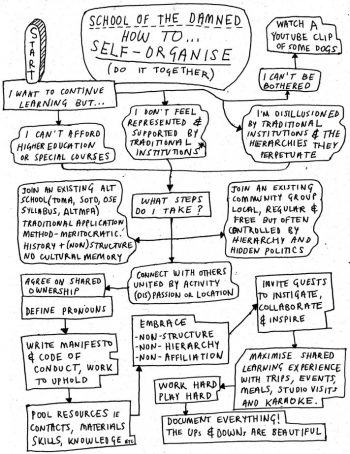
THE FIRST 100% OFFICIAL UNOFFICIAL ART EDUCATION OPEN-DAY is an informal open day exploring the plural experiences of alternative art schools and wider conversations of alternative education all together. An opportunity to get to know existing alternative art schools but also teach you how to DIY or DIT (Do It Together).
School of The Damned will use this day as the launch for inviting applications for 2018/19. Alongside this, alternative art schools or courses will showcase how they are unique through workshops presenting their individual identity; AltMFA, [ART&CRITIQUE], PACTO, School of the Damned, Syllabus, TOMA, Turps Banana.
For more details on each workshop please click the headings below or download the programme.
12:00 Welcome, tea & coffee
12:30 SOTD: Building an Active Archive
A workshop introducing ‘The Active Archive’: an online investigative tool for those interested in engaging with and facilitating alternative ways of learning. DOWNLOAD our page from the zine with an A4 poster.
13:00 Art&Critique: What is alternative art education?
Within the last ten years alternative art education has burgeoned into a full-blown movement, fuelled by economic crisis, austerity and the liberalisation of higher education. But what is alternative art education? Who is it for, and what is it an alternative to?
There are as many different formats and models of alternative art education as there are art schools, but in what ways is alternative art education expected to be different from traditional art education? Should alternative art schools try to emulate accredited MFAs or are they expected to radically re-imagine art education? What are the drawbacks of traditional art education and what practices are worth preserving? What alternative or radical pedagogies and practices would play an important part in alternative art education? What are the learning outcomes of alternative art education, and how should these be evaluated? How should alternative art schools be organised, structured and funded? Should they be free, accessible and self-organised? How do alternative art schools get access to resources and what do they need to become sustainable? Do alternative art schools have social and political obligations? Are alternative art schools expected to resist and reform institutional models of education and pedagogy? Should alternative art schools challenge art institutions and the art market? Should alternative art schools participate in political struggles of resistance against war, social injustice and climate change? What are the objectives of alternative art education?
Together we will address some of these questions, exchange ideas and discuss the future of alternative art education in a participatory workshop. Come along and bring your own questions and ideas to the discussion.
Download our zine page with an A4 poster in colour or black & white.
13:30 AltMFA
AltMFA is a recipe that we make up together, inventing as we go, using whatever ingredients we can get hold of – a cocktail of the personalities, passions and histories of whoever is at the meeting. Bring an ingredient to add to the strange salad we will be making together as we collectively transcribe the recipe for an alternative art school.
14:00 – 15:00 Lunch
15:30 Pacto: Radical Research Methods
Pacto would like to further explore how self organisation takes place. A workshop challenging the symposium to create a model for collaborative research.
16:00 Syllabus: Manifesto towards a Syllabus
Wysing Arts Centre’s Assistant Curator John Bloomfield will be joined by members Tom Smith and Frederica Agbah from Syllabus II and III to discuss the manifestos that each year’s group have drawn up. Composed during the first retreat of each year the manifestos are used to shape the ideals of the group and to lay down ground rules for the year ahead.
16:30 Turps Banana: Correspondance Course
Patricia Mulligan (Turps Banana) will be in conversation with Emily Woolley (SOTD) about her experience of the correspondance course and finding ways to practice and study post graduation.
17:00 TOMA: The Art Pub Quiz
TOMA invite you to form a team and take part to test your knowledge and forge discussions about alternative ways to educate yourself outside of the institutional system in 2017.
Self-organisation for education and pedagogy ART&CRITIQUE WORKSHOP
Friday, 14 July 2017, 18:30 – 20:30 LARC, 62 Fieldgate Street, London E1 1ES Closest stations: Whitechapel / Aldgate East
A workshop on self-organisation and collaborative, cooperative and collective practices in the context of our pedagogical remit. See the workshop outcomes and notes for collaborative research below.
1. What is self-organisation?
- Hierarchy
- Complimentarity / An interdependent lattice
- No single voice is more important than another
- Job rotation / anyone can step in when someone else is not available
- Autonomy / in-dependence / generating your own goals
- Rhizomatic
- Spreads the work
- Shared ways of working
- Different perspectives
- Funding
- Need for deadlines
- Transparency
Questions
- How do we bring disparate ideas into one clear thing?
- Do we need to compromise or does everyone have the same vision?
2. What are the benefits and drawbacks of self-organisation?
Benefits
- Momentum
- Delegation
- Accountability
- Job rotation
- Inclusivity
- Openness to ideas
- Freedom of ideas
- Flexibility
- Individuals sharing skills / knowledge
- [Self-reflection]
- [Self-paced]
Drawbacks
- Pulling in different directions
- Instability
- Lack of responsibility
- Lack of resources
- Slow progress
- Externally a perception of lack of authority
- Improvisation
Questions
- What is shared? Purpose, activities, ideas?
- How much is shared? What about authorship?
- What is a [minimum] structure?
- A decision-making structure? (Quaker Meetups)
3. How do we self-organise?
- A common destination
- Overlapping interests
- Urgency
- Getting to know people, bonding, building trust
- Where are people coming from? Locating their interests
- Membership
- Commitment to people
- Play
- Vulnerability / support
- Properly sharing
- Continuity
- Momentum
- Initiation / mentor/buddy (Festival in Mexico)
- Organisation
- Preparation
- Meetings / discussions (physical & virtual)
- Skills (complimentary)
- Building a pattern in regular meet-ups
- Deadlines (low pressure / high momentum)
- Contingency / check in (if people can’t make meetings)
- Balance of pushing but being patient
- Regular meetings, being in the same space
Questions:
- How do we develop shared aims?
4. Research questions
Self-organisation at ART&CRITIQUE This section deals with questions that we are asking with regard to our own practice, they are starting points for a research document on our own organising methods. We can consider how to structure the document when we’ve collected all the writing.
- How do we distribute authority? Can we use technology (Loomio, email, etc.) to distribute authority?
- What are the most effective methods of organisation currently practiced?
- What bearing do methods of organisation have on the endurance of groups?
- What broad categories do methods of organisation fall in?
- What problems have groups/individuals identified?
- What solutions have they identified?
- Write a paragraph for each topic that we’d like to focus on from the research proposal, adding new headings as they appear (methods of collaboration, co-operation and collectivity, decision-making, communication, distribution of labour, job rotation, self-care and mutual care and support, equality, accessibility, accountability, transparency, conflict resolution etc.).
- Develop the research questions that we want to ask and respond to those.
Interview questions These are questions that we want to ask the groups that we will be interviewing. These are starting points, drawing on questions from our research proposal. They will be developed in an upcoming meeting.
- What are your organisational and working methods?
- How have these evolved over time? (history)
- Do you have a constitution and what are the main points?
- What does membership in your group entail?
- What methods of self-organisation do you currently have in place?
- How is your group constituted in terms of membership, participation and decision-making?
- What aspects of self-organisation have been successful or rewarding?
- What aspects have been challenging or frustrating?
- What methods or tools have been developed to overcome problems and obstacles?
- What other methods would individual group members suggest to help groups overcome the problems that they have identified?
- How does technology facilitate or hinder collaboration and collectivity?
NOTES
- All collectives go through a crisis:
- Informal hierarchies: create inequality and power struggles, they cannot be addressed because they are informal. In a similar way that institutions calcify, informal hierarchies and practices are taken for granted (habitus is mimetic) and not addressed, challenged and changed. We wait and see how things work, in a foreign country you look around to see what other people are doing – we are mimetic. On the other hand, are informal hierarchies better because they privilege strong leaders? Should we seek them out and cultivate them?
- Dominant personalities and individuals who have the loudest voices:
- Emotions:
- Are there working groups at L? How do these work? How do we get involved? Similar problems at F and EC.
- Openness: addressing our attitudes as well as the rules.
- Freire > Hegel master/slave dialectic. 1. Pedagogy 2. Human interaction (Hegel proposes one model of conceptualising human interaction) 3. Oppression, subjugation, hegemony vs liberation, emancipation, freedom, responsibility > collectivity. We’re bringing all these into a dialectical process. How to square Hegel’s master/slave dialectic and Kristeva’s abject with commoning/collectivity/egalitarianism? Will we always have this antagonism? Will we always abject sections of society?
- Self-organisation – radical – finding ways for large groups to make decisions and act collectively for their mutual benefit, there are no real directions in the left, even though there are precedents than we can learn from / unearth e.g. Russian & Spanish anarchists, but the world has changed as well, there are new urgencies.
- Problem of open structures, how to include new people? It’s relatively easy for a small group, or gang – but what if you want to be inclusive and open? Inductions at F & EC.
